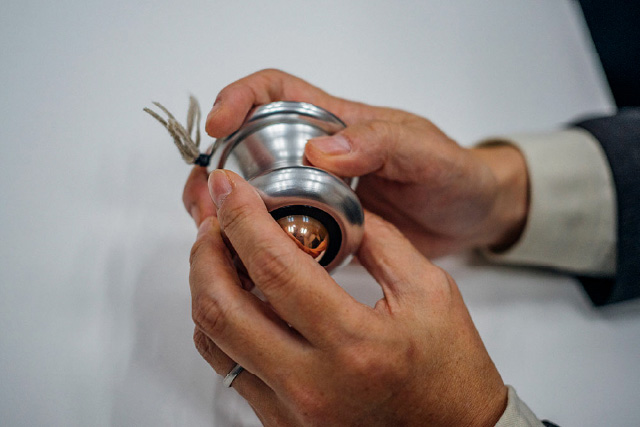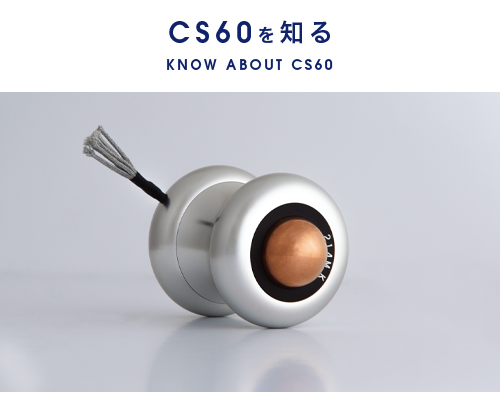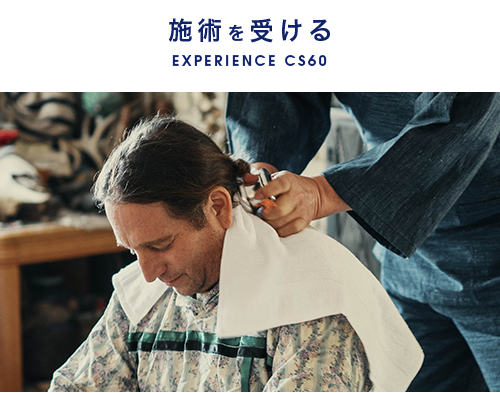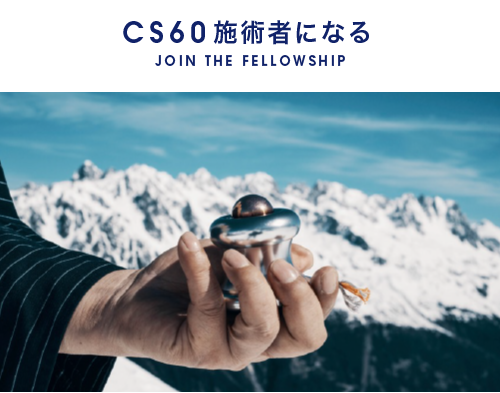
- 2020/01/16
-
Newsletter Vol.41
山口隆之先生インタビュー(後編)
Interview with Dr. Takayuki Yamaguchi (Part II)
« Interview avec le Professeur Takayuki Yamaguchi (Dernière Partie) »  前回に引き続き、山梨県の幼稚園の園長であり、中学・高校の副校長である山口隆之先生にインタビューしました。
前回に引き続き、山梨県の幼稚園の園長であり、中学・高校の副校長である山口隆之先生にインタビューしました。
―――――――――――――CS 60は、西村先生が夢の中で見た設計図を元につくりました。
それについて山口さんはどう考えていますか?山口:人間には未来の記憶というものがあります。目標や計画があって今の行動がありますよね。例えば「今晩カレーを食べよう」と思うときって、夕方の食卓で、みんなでカレーを食べるという未来の記憶を見ているんですよ。そこには無限の選択肢があり、選んだものからまた無数の未来が生まれます。カレーを食べる未来を選んだから、人参やタマネギを買いにいくという「今」の行動があるわけです。つまり、人は未来に原因を作るということです。
西村先生の場合は「痛みをなくしたい、地球を救いたい。この先に必ず何かあるはずだ」と考え続けた結果、遠い未来のビジョンが夢の中で出てきたのでしょう。西村先生はものすごく純粋な魂をもって、「人のため、地球のためになることしたい」と考え続けていたので、すばらしいものが見えてきたんだと思います。―なるほど。
山口:ふつうの人が持つ願望って、自分のため、家族のため、会社の経営者であれば「社員を食べさせていかないと」というくらいのものですよね。もっと大きなビジョンを持っていると、CS60のような革命的なものが生まれるのだと思います。
―「将来こうなりたい」というイメージがあったほうがより良く生きられるということですか?
山口:自分がこうなりたいとか、こういう仕事をしたいというのは自我です。僕は生徒たちに「どういう職業に就きたいか?」「どういう人生を送りたいか?」ではなく、「どういう社会になったらいいと思いますか?」「どういう地球だったらいいと思いますか?」と質問して、大きなビジョンを持ってもらっています。
―ふつうは「自分と家族が幸せになればいい」と考えますよね。
山口:それはあまりにもスケールが小さいです。キリストやブッダは、自分が死んだ1万年後ぐらいのことを考えていたと思います。20世紀まで、人間は自然科学の産物による幸せを追い求めてきたわけです。それは自我に基づいた繁栄だったことに、20世紀後半からみんな気づき始めました。市場経済は、誰かが儲かったら誰かが失う世界です。
それすら想像できない貧しい心を持つ人ばかりになってしまいました。―お金を稼ぎたいと思うのは悪いことですか?
山口:それこそ修行の別れ目だと思うのです。
お金を稼ぐのは、「いい服を着てフェラーリに乗って、タワーマンションに住みたい」というような、自分の欲求や快楽を満たすことが目的か。それとも誰かを救いたいのか。お金というものを通じて我々が試されていると思います。
CS60の施術者も、同じように、すごく試されているのです。(おわり)
Continuing on from last time, we are speaking with Takayuki Yamaguchi, principal of a kindergarten and vice principle of a middle and high school in Yamanashi Prefecture.
――――――――――――– The CS60 is made based on a set of designs Dr. Nishimura saw in a dream. What do you think of this fact?
Yamaguchi: Human being have what I would call memories of the future. We have goals and plans, and so we have our present behavior.
For example, you think “I’m going to have a curry for dinner tonight,” and so you see in your mind’s eye a future memory everyone eating curry together at the dinner table that night.
In that sense, you have infinite choices before you, and an infinite number of futures are born from those choices.
By choosing the future where you eat curry, you create the “present” in which you act by going to buy carrots and leek. In other words, human beings create the causes of the future.
In the case of Dr. Nishimura, by following the train of thought that says, “I will end pain and I will save the world, and there has to be some way forward in this,” he made a vision of the distant future appear to him in a dream.
Dr. Nishimura is possessed of an exceptionally pure soul, which made him continuously think that he wanted to do something for humanity and for the world, and which in turn is why he came to see wondrous things.– I see.
Yamaguchi: With normal people, their aspirations are limited to themselves, their families, or in the case of company managers, putting food on the table for their employees. By having a bigger vision, revolutionary things like the CS60 become possible.
– So you can live better if you have an image in your head of how you want to be?
Yamaguchi: The part of you that thinks “I want to be like this” or “I want to do this kind of work” is the ego. Instead of asking my students “what do you want to be when you grow up” or “what kind of life do you want to lead,” I ask them “what kind of society do you want to live in” or “how do you want the world to be when you grow up,” in order to get them to have a grander vision.
– You normally just worry about you and your family being happy, don’t you?
Yamaguchi: That’s just so small scale. Jesus or the Buddha thought about what the world would be like 10,000 years after they died. Human beings spent until the 20th Century in search of the happiness born of the products of natural science. People started noticing in the late 20th Century that that was a prosperity based on the ego.
The market economy is a world where if someone wins, someone else loses. We have become an impoverished people who cannot imagine anything more than that.– Is it wrong to want to make money?
Yamaguchi: I think that that in particular is an important juncture. The point of making money can be to wear nice clothes and drive a Ferrari and live in a fancy apartment, in other words to fulfill your own desires and pleasures. Or it can be to save someone else.
I think money is something through which we are tested.
In the same way, CS60 practitioners are also being tested.(End)
Nous continuons d’interviewer le Professeur Takayuki Yamaguchi qui est à la fois directeur d’une école maternelle et directeur adjoint d’un collège et d’un lycée dans le département de Yamanashi.
――――――――――――– Le Professeur Nishimura a créé le CS60 conformément au plan qu’il a vu dans son rêve.
Qu’en pensez-vous ?Yamaguchi : Nous, les hommes, avons en effet une mémoire du futur.
Nous avons des objectifs et des projets pour le futur. C’est pourquoi nous agissons dans le temps présent.
Quand nous comptons manger du curry le soir, nous imaginons que nous mangeons ensemble à la table : c’est la mémoire du futur
Nous avons des choix infinis et des choix infinis de futur sont créés à partir des choix que nous faisons dans le temps présent.
Comme nous choisissons de manger dans le futur proche, nous achetons « dans le temps présent » des carottes et des oignons. Autrement dit, nous retrouvons dans le futur des raisons pour lesquelles nous agissons dans le temps actuel.
En parlant du professeur Nishimura, il souhaitait tout le temps éliminer les douleurs et sauver la terre. D’ailleurs, il pensait vraiment qu’il devait y avoir quelque chose de bon dans l’avenir. C’est pourquoi il a eu une vision d’un avenir lointain dans son rêve.
Je pense que comme il souhaitait vraiment servir les gens et la terre avec son âme très pure, il a pu voir cette chose extraordinaire.– Je vois.
Yamaguchi : Nous, les gens normaux, souhaitons simplement du bonheur pour nous-même ou pour notre famille. Si on gère une entreprise, on pense juste à nourrir ses employées.
Quand on a une vision plus large, on peut créer quelque chose de révolutionnaire comme le CS60.– Voulez-vous dire qu’on peut vivre mieux avec des visions concrètes pour l’avenir ?
Yamaguchi : Une vision personnelle comme par exemple un désir concernant son futur travail est un ego. Moi, je demande toujours aux élèves : « quelle société est idéale pour vous ? » ou « quelle est la terre idéale pour vous ? ». Je ne leur demande jamais quel est leur propre désir concernant leur carrière ou leur vision de la vie. Je voudrais qu’ils aient une vision plus large.
– Normalement, nous souhaitons simplement du bonheur pour soi et sa famille.
Yamaguchi : C’est une pensée trop étroite.
Je pense que Jésus-Christ et Bouddha ont pensé pour le futur environ 10,000 ans après leur mort.
Les hommes ont jusqu’au XXème siècle poursuivi un bonheur qui a pu être apporté par les fruits des sciences naturelles.
Ils se sont rendu compte durant la deuxième moitié du XXème siècle que c’était une prospérité basée sur leur ego.
Dans le monde de l’économie du marché, si une personne gagne, l’autre perd.
Il y a malheureusement de nombreuses personnes qui ne peuvent même pas imaginer ce fait.– Avoir le désir de gagner de l’argent est-il mauvais ?
Yamaguchi : C’est justement un tournant de l’apprentissage.
Vous voulez gagner de l’argent pour satisfaire vos désirs ou vos plaisirs personnels comme acheter de beaux vêtements, obtenir une Ferrari et habiter dans un appartement de luxe ? Ou bien vous voulez sauver quelqu’un avec de l’argent ?
Nous sommes en effet testés au travers de l’argent.
Les praticiens du CS60 sont également testés.(fin)
INDEX















